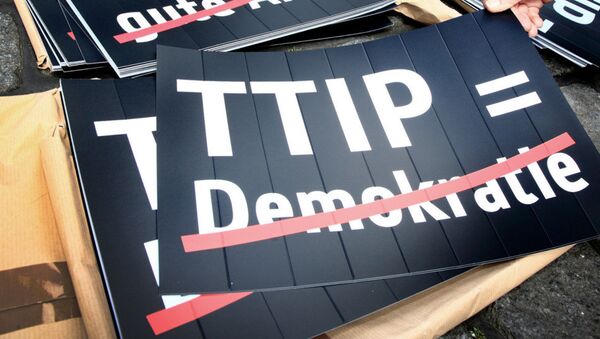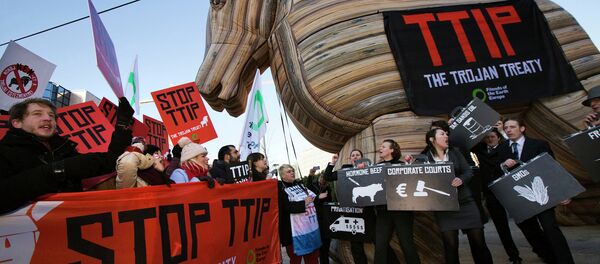The controversial TTIP agreement has been pushed through by US President Barack Obama, who has called for the negotiations for the world's biggest trade agreement to be speeded up. As the talks get underway in Brussels on May 7, the Independent Expert on the promotion of a democratic and equitable international order, Alfred de Zayas, expressed deep concerns over the talks.
Trade Council this morning. Will discuss state of play TTIP, our new proposals for reformed investment court and Doha negotiations.
— Cecilia Malmström (@MalmstromEU) May 7, 2015
Missed @MalmstromEU's discussion on #TTIP & #ISDS with @EP_Trade committee? Our #Storify recap http://t.co/qfVCCeZ2zR pic.twitter.com/75lyqR3BML
— European Parliament (@Europarl_EN) May 6, 2015
Speaking ahead of the meeting, de Zayas said: "I am concerned about the secrecy surrounding negotiations for trade treaties, which have excluded key stakeholder groups from the process, including labor unions, environmental protection groups, food-safety movements and health professionals.
"Proactive disclosure by governments, genuine consultation and public participation in decision-making are indispensable to make these agreements democratically legitimate. 'Fast-tracking' adoption of such treaties has a detrimental impact on the promotion of a democratic and equitable world order."
The talks are aimed at securing a comprehensive Transatlantic Trade and Investment Partnership (TTIP) that will be the world's biggest ever bilateral trade and investment deal.
The EU and the US already trade goods and services worth $2.3 billion (€2 bn) on a daily basis, but the TTIP would create further growth and new opportunities by eliminating red tape and tariffs wherever possible to reduce costs and open up new markets.
Multinationals Will Dominate Government
However, critics say the TTIP will pave the way for huge multinationals to have more controlling powers than governments.
According to the Gala Foundation, the TTIP's regulatory harmonisations will ignite a "race to the bottom" of environmental regulations in the EU, so that they come to resemble the USA's far weaker regulatory system.
Don’t forget to vote & don’t forget that #TTIP is a huge threat to what our elected representatives are able to do. pic.twitter.com/TCq5SrDyeb
— Global Justice Now (@GlobalJusticeUK) May 6, 2015
Many analysts agree that TTIP is a trojan horse for big food corporations aiming to avoid food safety regulations and undermine sustainable agricultural practices in their rush for profits and trade.
Global Justice now said:
"For the first time on a grand scale, corporations would be able to sue governments if they make public policy decisions which could harm their future profits. Regulation which currently protects people, public services and the environment could be removed."




